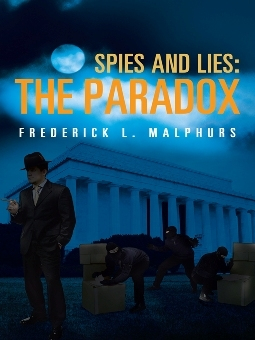Spies and Lies
The Paradox
David Pearl’s job is anything but boring.
Employed by the CIA until his job is outsourced, Pearl starts his own security firm, but he is struggling to keep it afloat. When he is hired by the Greek Embassy in Washington, DC to guard Nicolaos Polopolis, a political affairs attaché who is receiving anonymous threats, business picks up, which creates a new set of problems, as Pearl and his staff become embroiled in a dangerous crime ring. Additional cases are rolling in, including another contract from the Greek Embassy; a request to work on the murder investigation of Dr. Cardiff Shapiro, a US State Department undersecretary of terrorism and financial intelligence; an investigation involving a Russian spy; and an offer to look into a company’s potential breach of data security. Pearl and his staff must juggle these cases, risking their own lives in the process.
In Spies and Lies: The Paradox, Frederick L. Malphurs, who is familiar with governmental procedures, having worked for the US Department of Veteran Affairs for thirty-seven years, places his main characters in many action-filled and perilous situations. Unfortunately, Pearl’s heavy caseload undermines the book’s dramatic impact. No single scene stands out as the climax.
Pearl and his core staff members are likable characters, but with so many subplots and secondary characters with intricate backstories introduced in nearly every chapter, the main characters are relegated to supporting roles. For example, while on the job, Pearl meets Sophia Vogiatzis, assigned by the Greek Embassy to assist on the Polopolis case. They instantly fall in love, and their relationship is significant to the outcome of the story, but Malphurs focuses more on describing the actions of peripheral characters than he does on developing the romance between Pearl and Vogiatzis. As a result, the romantic subplot does not feel realistic.
Malphurs provides extensive details about Pearl’s investigative procedures, but there are no revelatory insights offered about the inner workings of the government. In addition, important plot points are often described by characters in long, monologue-style dialogue, which is cumbersome to decipher. Overall, the details are so technical and overwhelming that only readers with knowledge of intelligence gathering will be able to easily follow the complex narrative and its multiple subplots. Ordinary details, from food and drink preferences to hobbies, are also presented at great length, further slowing down the pace.
If the name Pearl is familiar, it’s because Malphurs’s novel aims to reimagine the reporting Wall Street Journal reporter Daniel Pearl would have done had he not been kidnapped and murdered in Pakistan while investigating shoe-bomber Richard Reid’s potential connections to Al-Qaeda. David Pearl is Daniel’s fictional cousin, but his connection to the real journalist’s goals are not evident in the book. Rather than political commentary, the focus is on David’s desire to establish a successful security firm.
David is the common thread linking the novel’s many complicated subplots, but his role is not cohesive enough to avoid a frantic and confusing story line.
Reviewed by
Maria Siano
Disclosure: This article is not an endorsement, but a review. The publisher of this book provided free copies of the book and paid a small fee to have their book reviewed by a professional reviewer. Foreword Reviews and Clarion Reviews make no guarantee that the publisher will receive a positive review. Foreword Magazine, Inc. is disclosing this in accordance with the Federal Trade Commission’s 16 CFR, Part 255.

